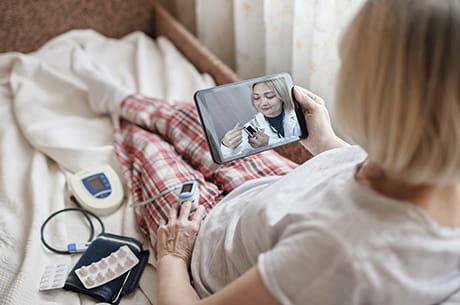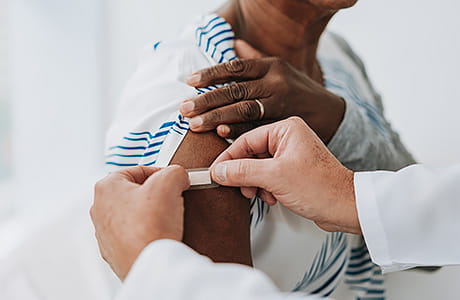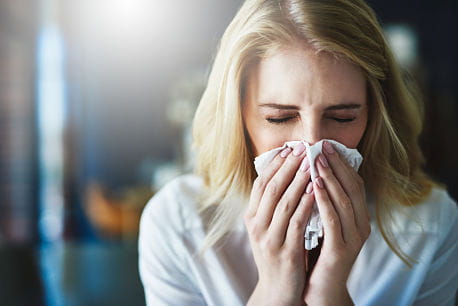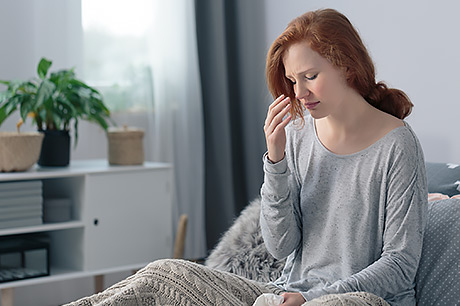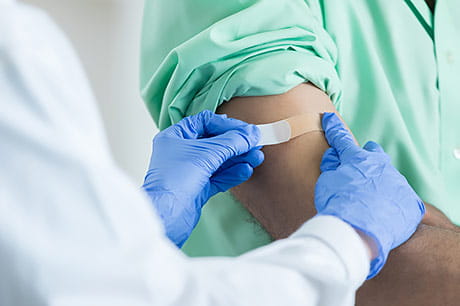Treating COVID-19: What are monoclonal antibodies?
This innovative treatment for COVID-19 can reduce symptoms and length of illness, as well as prevent hospitalization.
Treating patients with monoclonal antibodies isn’t new. In fact, doctors have been using them for decades in the treatment of certain illnesses, such as cancer.
Now, they’re being used to treat people infected with COVID-19 who are at a high risk of severe illness — and results are promising.
What are monoclonal antibodies?
Our immune systems naturally create millions of proteins, called antibodies. These antibodies search for and attach themselves to foreign cells (or antigens) and help the immune system fight off harmful antigens, like viruses.
Monoclonal antibodies are laboratory-made proteins that mimic our immune system's ability to fight off antigens, like the SARS-CoV-2 virus that causes COVID-19.
These one-time antibody treatments are being administered via intravenous infusion to help treat COVID-19.
“What makes monoclonal antibodies unique is that they’re one of the few treatment options available for people before they’re sick enough to require hospitalization,” says Keith Boell, DO, Geisinger’s chief quality officer for population initiatives.
Are monoclonal antibodies effective against COVID-19?
Like other treatments or emergency therapies that have been used during the coronavirus pandemic, monoclonal antibodies have received emergency use authorization from the U.S. Food and Drug Administration.
“This means that the treatment is being made available in a limited capacity while research continues,” explains Dr. Boell.
So far, studies suggest that patients with COVID-19 who meet criteria and are treated with monoclonal antibodies are less likely to require hospitalization. In fact, recent data show that this therapy can prevent hospitalization in about 70% of high-risk patients.
“We’re seeing that monoclonal antibodies can help limit the number of people who require hospitalization. And that relieves strain on hospitals and healthcare workers,” adds Dr. Boell.
Preliminary research also suggests that monoclonal antibodies appear to be effective against COVID-19 variants, too.
Who can get the monoclonal antibody treatment?
Supplies are limited, so monoclonal antibodies are given to those who have the greatest chance of benefiting from the treatment.
“This treatment is being used for non-hospitalized patients in the early stages of COVID-19 infection,” says Dr. Boell. “And there’s specific criteria to be eligible for treatment.”
These criteria include:
- Having a positive test for the virus that causes COVID-19
- Having a condition that puts you at high risk for severe illness from COVID-19, such as:
- Over age 65
- Obesity defined as a BMI over 25 (or if age 12–17, a BMI over 85th percentile for age and gender)
- Pregnancy
- Chronic kidney disease
- Diabetes
- Immunosuppressive disease or immunosuppressive treatment
- Cardiovascular disease or hypertension
- Chronic lung disease (e.g., COPD, asthma, interstitial lung disease, cystic fibrosis, pulmonary hypertension)
- Sickle cell disease
- Neurodevelopmental disorders
- Medical-related technological dependence
- Not in the hospital
- Having mild to moderate sickness with COVID-19 (meaning no new oxygen or increased oxygen [if on oxygen already])
- Being able to start treatment within 10 days of COVID-19 symptom onset
“We’re evaluating patients who have tested positive for COVID-19 at Geisinger to see if they’re eligible to receive monoclonal antibodies and contacting them based on the amount of supply we have,” explains Dr. Boell. “Doctors may also refer patients for treatment if they test positive for COVID-19 outside of Geisinger and meet the criteria as defined by the emergency use authorization.”
Are there any side effects?
With any experimental treatment or therapy, it’s understandable to be concerned about potential side effects. During clinical trials of monoclonal antibodies, few side effects were reported.
“The most common side effects are nausea, diarrhea, dizziness, headache, skin irritation and vomiting,” says Dr. Boell. “Allergic reactions are possible, but rare.”
What’s next?
While monoclonal antibodies are a potential tool to prevent hospitalizations and reduce the strain on healthcare organizations, it’s critical that everyone continue to take steps to avoid getting COVID-19.
“It’s important that everyone continue to take precautions, like masking and physical distancing in public and getting the COVID-19 vaccine, to help slow the spread of COVID-19,” says Dr. Boell. “We’re looking forward to when monoclonal antibody treatments are more readily available so they can be offered to everyone who can benefit from them.”
To see if you're eligible to receive monoclonal antibodies, contact your doctor.
Next steps:
Meet Keith Boell, DO
Learn about COVID-19 testing
Schedule your COVID-19 vaccine appointment
